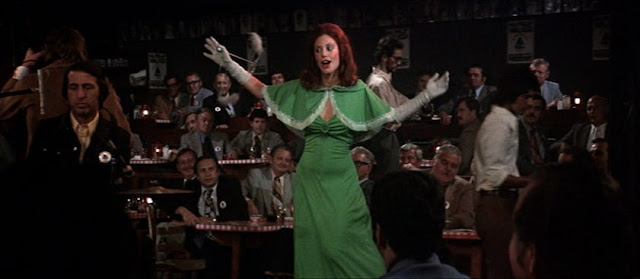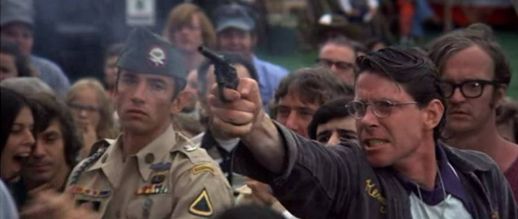Robert Altman’s magnum opus Nashville can be looked at as a time capsule of an era long gone but not forgotten. It is nearly three hours of music and mood featuring a massive assembly of talent from the era that services a virtually non-existent plot. That is not a complaint. There isn’t really a plot in the conventional sense of the word but there is a through line that holds it all together and becomes obvious during the final act what it is all leading up to. Robert Altman even sprinkles in some not-so-subtle hints of the finale throughout with images of politicians, JFK specifically, seen prominently.
There are so many in the cast that it can seem overwhelming trying to keep track of them all. Altman seems to have understood this as he has cast well known actors and performers in most of the roles making it a little easier to follow. Many of this cast became even bigger names afterwards and it is fun to see them at a much earlier stage of their careers. A particular standout is Geraldine Chaplin, daughter of silent film legend Charlie Chaplin, playing Opal, a celebrity obsessed chatterbox who allegedly is a BBC radio documentarian. She is along for the ride, rushing off every time a celebrity shows up, ready to shove a microphone in their face. Her interaction with the great Elliot Gould is a particular standout moment.
Another great performance is the late Shelley Duvall playing the self-monikered “L.A. Joan.” She has come to Nashville ostensibly to visit her dying Aunt Martha. Her uncle, Mr. Green (Keenan Wynn) will spend most of the film trying to reign L.A. Joan in so she can see her aunt but it never happens. Shelley Duvall has a very distinct voice and figure. The movie takes advantage of that by teasing it without showing us her face for nearly a half hour. On top of that, she is given some of the most unique outfits of the entire film, outfits that are so over-the-top that they would become comical shorthand for the 1970’s in later films.
So much of the film is setting up the atmosphere of the era, not only the style and music but also the political climate of the time. This is just twelve years since the JFK assassination and the people of this decade seem lost at times, wandering and not quite sure where they ultimately want to land. The film opens with Haven Hamilton (Henry Gibson), a Nudie suit wearing Grand Ole Opry star performing a new song commemorating the upcoming bicentennial of the United States. He, alongside Barbara Jean (Ronee Blakley), represent the singers who have made it in Nashville and he has some political ambitions but is overly sensitive about his short stature. He also has a temper when the session musicians aren’t 100% on the same page as him. Barbara has recently been released from the hospital, ostensibly for a burn accident but more likely a nervous breakdown, and she is not quite okay, wandering off target and rambling on when she should be singing on stage.
I was not born at the time this film is portraying. I missed it by a single year but would not be aware of the world around me for at least another five years. Most of what I know from the mid-seventies comes from films like Saturday Night Fever and other anachronistic films made in the 80’s and 90’s that exaggerate their view of the 1970’s. That makes a picture like this really feel like I’m looking at a whole different world than the one I grew up in because it is depicting the same year it was filmed in and showing it in a way that is raw and real. The youth of today will have a hard time relating to it. It really is a product of its time, representing a world that was a lot more carefree than what we have in our modern society. This also translates into the filmmaking style of it, too. This is a sometimes frustrating viewing as so much of this film is long shots of musical performances, often song after song after song before the story is allowed to progress. These moments service the characters on stage but are left to play out for far too long and, unless you really love 1970’s country and bluegrass music, can become tedious and feel like filler. The sole exceptions are whenever Sueleen Gay (Gwen Welles) performs.
Sueleen Gay is a waitress desperately wanting to become a professional singer. The problem is she has absolutely no talent, yet she has no sense of just how bad she actually is. Whenever she is given the stage it is painful to listen to and makes for a combination of hilarious and deeply sad emotions as the audiences quickly turn on her. We laugh at how bad she is singing but also feel bad for her as she is blissfully unaware of her lack of talent. This will go from bad to worse when she is compelled, after a particularly bad performance, to strip for the audience. Afterwards she will defiantly insist that she is not a bad singer and soon will be a star.
There is no such thing as a starring role in this film. Fortunately the Academy Awards didn’t even try to offer up a nomination in the leading actor/actress categories. There are twenty-five main cast members in this ensemble picture and none of them get enough screen time to be considered a lead. Instead everyone is allotted a short amount of time intermixed into the many many gatherings that make up the bulk of the film. Lily Tomlin gets a few memorable scenes as the gospel singer, Linnea, who is having an affair with a rock musician who is only using her for sex. He is so callous that when she has to leave early after one of their affairs he is on the phone as she dresses calling up another one of his girlfriends to arrange another dalliance. She balances this life with that of her husband and two deaf children that she obviously loves very much.
Nashville is the type of film that appeals primarily to those who lived through this era and remember it fondly. It’s look, it’s feel, and it’s messages about love, sex, music and politics are a product of the times and can be enjoyed on that level but the appeal will be primarily limited to those who participated in that climate. To those of us who came later it is an interesting look into the mindset of a different time but it plays too much on the musical performances, which often bring the story to a screeching halt, and it ends on a harsh note that is only really shocking if you haven’t been paying attention, throughout. The film is never boring but it never really got exciting, either. For me it was an interesting look at the times but one that I don’t see ever revisiting.
Academy Award Nominations:
Best Picture: Robert Altman
Best Director: Robert Altman
Best Supporting Actress: Lily Tomlin
Best Original Song: I’m Easy by Keith Carradine
____________________________________________________
Release Date: June 11, 1975
Running Time: 160 Minutes
Rated R
Starring: David Arkin, Barbara Baxley, Ned Beatty, Karen Black, Ronee Blakley, Timothy Brown, Keith Carradine, Geraldine Chaplin, Robert DoQui, Shelley Duvall, Allen Garfield, Henry Gibson, Scott Glenn, Jeff Goldblum, Barbara Harris, David Hayward, Michael Murphy, Allan F. Nicholls, Dave Peel, Cristina Raines, Bert Remsen, Lily Tomlin, Gwen Welles and Keenan Wynn
Directed By: Robert Altman









Comments
Post a Comment